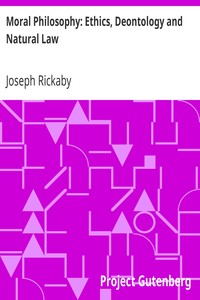Moral Philosophy: Ethics, Deontology and Natural Law by Joseph Rickaby
"Moral Philosophy: Ethics, Deontology and Natural Law" by Joseph Rickaby is a philosophical treatise written during the early 20th century. The text explores the complex relationships between moral obligation, ethical theories, and the natural law philosophy, delving into the intricacies of human acts, happiness, and duty. Rickaby distinguishes between ethics as the study of happiness and deontology as the science of duty, framing a comprehensive understanding of moral philosophy. The opening of
the book introduces the subject matter, defining moral philosophy as the science of human acts concerning both happiness and duty. It argues that all human acts are purposeful attempts aimed at attaining some form of happiness, which is articulated through the author’s interpretation of Aristotle's ethics. Rickaby critiques previous ethical frameworks for neglecting the concept of moral obligation and argues for a tripartite division of moral philosophy that covers ethics, deontology, and natural law. The author emphasizes the importance of understanding how ethics influences human behavior while also emphasizing the role of deontology in delineating moral laws and obligations. Overall, this opening establishes a foundational viewpoint for the ensuing discussions on morality and ethical conduct. (This is an automatically generated summary.)
Read or download for free
| How to read | Url | Size | |||
|---|---|---|---|---|---|
| Read now! | https://www.gutenberg.org/ebooks/8103.html.images | 661 kB | |||
| EPUB3 (E-readers incl. Send-to-Kindle) | https://www.gutenberg.org/ebooks/8103.epub3.images | 333 kB | |||
| EPUB (older E-readers) | https://www.gutenberg.org/ebooks/8103.epub.images | 341 kB | |||
| EPUB (no images, older E-readers) | https://www.gutenberg.org/ebooks/8103.epub.noimages | 315 kB | |||
| Kindle | https://www.gutenberg.org/ebooks/8103.kf8.images | 628 kB | |||
| older Kindles | https://www.gutenberg.org/ebooks/8103.kindle.images | 588 kB | |||
| Plain Text UTF-8 | https://www.gutenberg.org/ebooks/8103.txt.utf-8 | 619 kB | |||
| Download HTML (zip) | https://www.gutenberg.org/cache/epub/8103/pg8103-h.zip | 326 kB | |||
| There may be more files related to this item. | |||||
Similar Books
About this eBook
| Author | Rickaby, Joseph, 1845-1932 |
|---|---|
| Title | Moral Philosophy: Ethics, Deontology and Natural Law |
| Note | Reading ease score: 65.2 (8th & 9th grade). Neither easy nor difficult to read. |
| Credits | Produced by Charles Aldarondo, Tiffany Vergon, David King, Charles Franks and the Online Distributed Proofreading Team |
| Language | English |
| LoC Class | BJ: Philosophy, Psychology, Religion: Ethics, Social usages, Etiquette, Religion |
| Subject | Ethics |
| Category | Text |
| EBook-No. | 8103 |
| Release Date | May 1, 2005 |
| Most Recently Updated | Dec 26, 2020 |
| Copyright Status | Public domain in the USA. |
| Downloads | 244 downloads in the last 30 days. |
| Project Gutenberg eBooks are always free! | |


